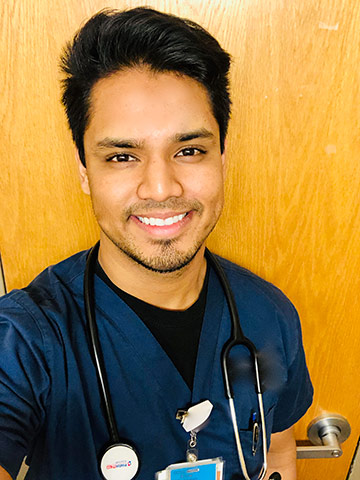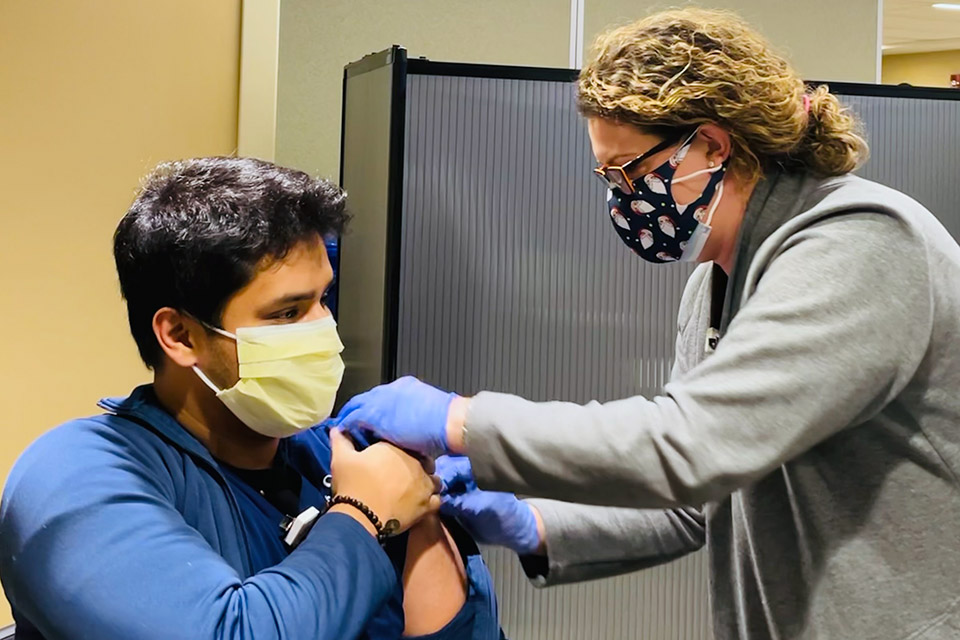Spotlight: Charles Roy, COVID Nurse and Law Student
12/17/2020
As a nurse working with COVID-19 patients, health law student Charles Roy has had an up-close look at the pandemic.

“As a law student, we debate [mask] mandates, laws. As a health care worker, the rubber really meets the road,” Roy said. “When I walk into work, the units are full of COVID patients, and not just COVID patients, but to be admitted, you are truly struggling to breathe. If I go in and three patients are short of breath simultaneously, forget the policies – which direction do I take my feet?”
Roy is a float nurse at SSM Health St. Joseph Hospital – Lake Saint Louis, which means he goes from unit to unit to work wherever the need is greatest. As such, he gets a thorough survey on what’s happening across the hospital. During the pandemic, he’s been on a mission to educate not only his patients but the public about the risks involved with COVID-19 without “sounding like a broken record” but providing his unique perspective.
“[At the beginning] most hospitals designated a specific unit for COVID-positive patients, and as time progressed, one unit was just not enough,” he said. “Now, most hospitals are between 50 to 60% COVID patients, so they’ve literally overflowed into every other unit; we just don’t have space.”
While local leaders often focus on the number of hospital beds remaining in area hospitals, Roy argues that is not the only concern. “It’s not how many beds are open, it’s how many staffed beds are available. Your limiting factor is your human resource,” he said.
Roy notes that an overflow of COVID patients affects the whole hospital system, including other patients’ ability to receive care. During this time more than ever, he has seen a parallel between nurses and lawyers.
The education I’m receiving especially this semester – not many students get to do what I do, which is directly apply legal knowledge into the field in practice, and I’m very, very fortunate and grateful for that opportunity.”
Charles Roy
“Professor Stewart gave a moving speech at the beginning of 1L year and said that as an attorney, you hold the key of life and death for millions of people. The same is very much true for nurses on a practical level.”
His two roles inform each other, he says, and he is a better advocate for his patients because of his legal knowledge. Roy credits his classes with Professor Rob Gatter and adjunct professor Chris Scofield (’14), senior legal counsel for SSM Health, as being especially beneficial.
“The education I’m receiving especially this semester – not many students get to do what I do, which is directly apply legal knowledge into the field in practice, and I’m very, very fortunate and grateful for that opportunity.”
Surprisingly, Roy did not always envision himself as a nurse or a lawyer. After graduating from the University of Missouri-St. Louis in 2014 with a nursing degree on a premed track, Roy began working in order to support his family after his father died, but planned to pursue medical school down the road. Over time, though, he realized he wanted to have a bigger impact on the health care system than he could as a physician.
The issue of access to health care and specifically to preventative care is Roy’s passion, and where he plans to merge his nursing and legal professions as an entrepreneur. This past June, he launched his own company, Grace Infusions and Phlebotomy, LLC, through which he goes directly to patients’ residences to do phlebotomy work and "bring health care to homes," especially for older individuals who can’t afford to get inpatient care or don’t want to go in to a hospital and potentially become exposed to COVID-19. By doing this, he hopes to detect health problems earlier before they spiral out of control.
“If a visit from a nurse costs you $250, versus going to the hospital is $25,000 – I don’t want health care to be a scary thing,” he said. “I’m an immigrant; I grew up in poverty. I knew growing up I couldn’t afford a copay. I was scared, uninformed and ashamed. That’s what I don’t want for others. I wish that more companies and more attorneys would focus on making health care accessible. It shouldn’t be a luxury. Once I graduate, I’m determined to forward that cause as much as I can. And I’ll try to use the legal background to make it so that more companies are incentivized on prevention and not so much intervention after the fact.”
When asked what attorneys could do to help during the pandemic, Roy asks for help educating the public about the importance of having health care directives in place.
“I spend way too much time trying to decide what a patient's true code status is,” he said. “If you’re not going to wear a mask, have an advanced directive.
“I see a lot of death,” Roy continued. “You see someone who’s in their 80s or 90s, they’ve lived through World War II, the Korean War, and here they are, in a room with me covered in full PPE, having to say goodbye to their family on an iPad – that’s never something we consider when we imagine our own deaths.”
The good news is that a vaccine for the general public is imminent. As a health care worker, Roy was one of the first in the nation to receive his on Thursday.
“We’re in the home stretch,” he said. “Our goal in the community is to just hold off for another few weeks and start 2021 on a fresh, brand new note. Start off by getting the vaccine and remembering the lessons from 2020."
Learn more about the Center for Health Law Studies
Learn about other student, alumni and faculty responses to COVID-19
